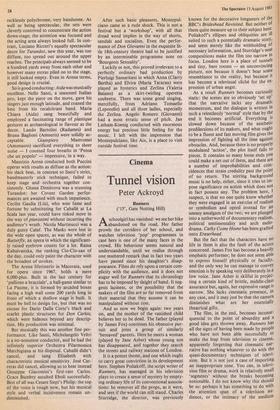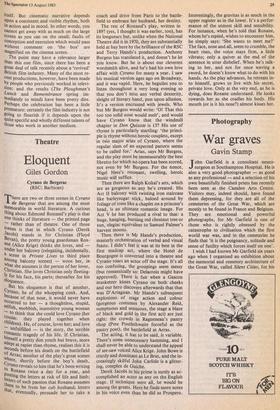Cinema
Tunnel vision
Peter Ackroyd
Runners ('15', Gate Notting Hill)
Aschoolgirl has vanished: we see her bike abandoned on the road. Her father prowls the corridors of her school, and watches television 'pop' programmes in case hers is one of the many faces in the crowd. His behaviour seems natural and understandable, until we realise through one muttered remark that in fact two years have passed since his daughter's disap- pearance. Films do rely upon a certain com- plicity with the audience, and it does not augur well for Runners that its chronology has to be imposed by sleight of hand. It sug- gests laziness, or the possibility that the makers of the film are so far removed from their material that they assume it can be manipulated without cost.
And so now we begin again: two years on, and the mother of the vanished child believes her to be dead. The father (played by James Fox) continues his obsessive pur- suit and joins a group of similarly 'bereaved' parents. Here he meets a woman (played by Jane Asher) whose young son has disappeared, and together they search the streets and railway stations of London.
It is a potent theme, and one which ought to carry great conviction in its development here. Stephen Poliakoff, the script writer of Runners, has managed in his television plays to create a sense of mystery by empty- ing ordinary life of its conventional associa- tions: he removes all the props, as it were, and sees if the world can still stand. Charles Sturridge, the director, was previously known for the decorative longueurs of the BBC's Brideshead Revisited. But neither of them quite measure up to their subject here: Poliakoff's ellipses and obliquities are ill suited to such a potentially dramatic story, and seem merely like the withholding of necessary information, and Sturridge's neat compositions make the film too narrow in focus. London here is a place of tunnels and tiny, bare rooms — an unconvincing picture, not because it doesn't bear some resemblance to the reality, but because it has become a televisual cliche for the ex- pression of urban angst.
As a result Runners becomes curiously static: the scenes are so obviously 'set up that the narrative lacks any dramatic momentum, and the dialogue is written in such a relentlessly 'normal' style that by the end it becomes artificial. Everything Is slowed down because of the aesthetic predilections of its makers, and what ought to be a fluent and fast moving film gives the impression of fighting all the time against obstacles. And, because there is no properly modulated 'action', the plot itself falls to pieces. It contains so many loose ends you could make a net out of them, and there are a number of improbabilities and coin- cidences that strain credulity past the point of no return. The stirring background music is no help, either, since it tries to im- pose significance on action which does not in fact possess any. The problem here, I suspect, is that no one quite knew whether they were engaged in an exercise of realism or symbolism and opted instead for an uneasy amalgam of the two; we are plunged into a netherworld of documentary realism, political sentimentality and arch melo- drama. Cathy Come Home has been grafted onto Eraserhead.
But the fact that the characters have no life in them is also the fault of the actors concerned. James Fox has become a heavily emphatic performer; he does not seem able to express himself physically or facially, and the only way he can manage to convey emotion is by speaking very deliberately in a low voice. Jane Asher is skilful in projec- ting a certain kind of brittle, middle-class assurance but, again, her expressive range is narrow. She lacks cinematic presence, in any case, and it may just be that the camera diminishes what are her essentially theatrical gifts.
The film, in the end, becomes inconse- quential to the point of absurdity and a good idea gets thrown away. Runners has all the signs of having been made by people who have not been able successfully 10 make the leap from television to cinema, apparently forgetting that cinematic nar- rative has nothing whatever to do with the quasi-documentary techniques of televi- sion. But it is not just a case of importing an inappropriate tone. You can, in televi- sion film or drama, work in relatively small 'segments' without the breaks becoming noticeable. I do not know why this should be so: perhaps it has something to do with the attention span of a television au- dience, or the intimacy of the medium
itself. But cinematic narrative depends upon a consistent and visible rhythm, both in action and in mood. In other words, you cannot get away with as much on the large screen as you can on the small; faults of conception and execution which would pass without comment on 'the box' are magnified on the cinema screen.
The point may have a relevance larger than this one film, since there has been a great deal of talk recently about a 'revived' British film industry. Many of the most re- cent productions, however, have been made by people who previously worked in televi- sion: and the results (The Ploughman's Lunch and Remembrance spring im- mediately to mind) have been pretty dire. Perhaps the celebration has been a little Premature: certainly the film industry is not going to flourish if it depends upon the quite specific and wholly different talents of those who work in another medium.







































 Previous page
Previous page